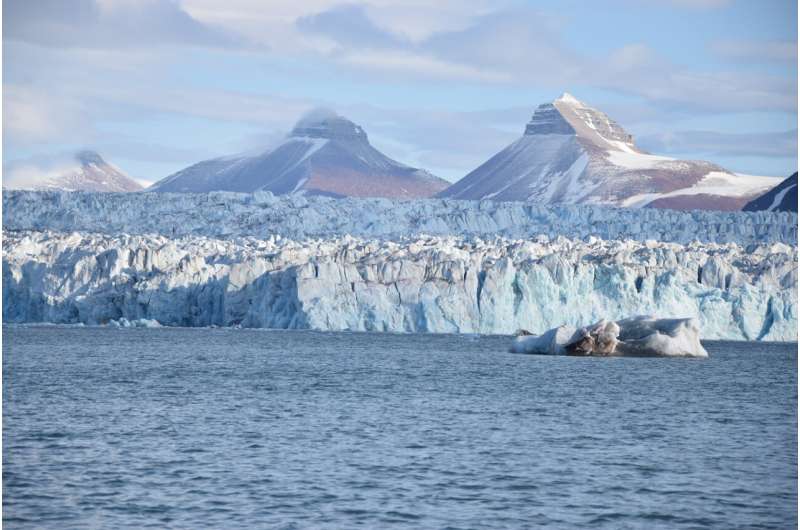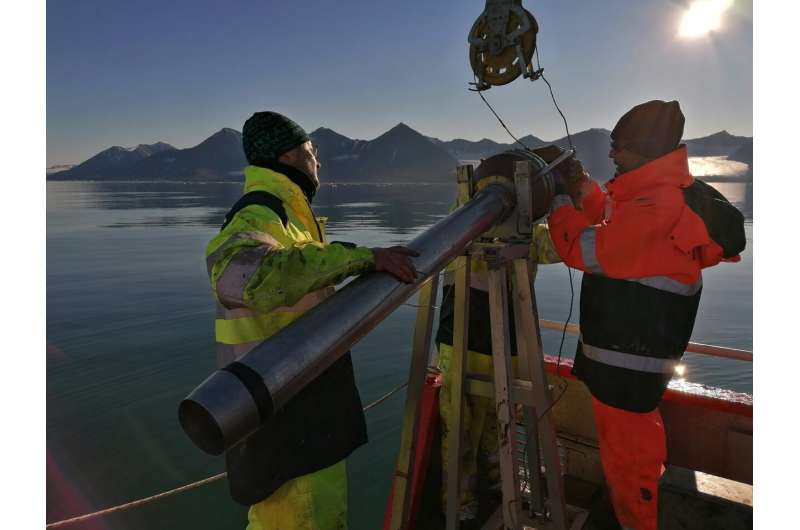By P Gosselin
In a recent paper, scientists expressed their surprise that the Arctic had started warming already back in the early 20th century, 100 years ago. This, along with the obligatory CO2 climate warming lip service, is described in a Cambridge University press release.
==================================
Arctic Ocean started getting warmer decades earlier than we thought, study finds

An international group of researchers reconstructed the recent history of ocean warming at the gateway to the Arctic Ocean in a region called the Fram Strait, between Greenland and Svalbard, and found that the Arctic Ocean has been warming for much longer than earlier records have suggested. Credit: Sara Giansiracusa
Natural oceanic currents
The Arctic Ocean has been getting warmer since the beginning of the 20th century—decades earlier than records suggest—due to warmer water flowing into the delicate polar ecosystem from the Atlantic Ocean.
An international group of researchers reconstructed the recent history of ocean warming at the gateway to the Arctic Ocean in a region called the Fram Strait, between Greenland and Svalbard.
Atlantic waters flow into the Arctic
Using the chemical signatures found in marine microorganisms, the researchers found that the Arctic Ocean began warming rapidly at the beginning of the last century as warmer and saltier waters flowed in from the Atlantic—a phenomenon called Atlantification—and that this change likely preceeded the warming documented by modern instrumental measurements. Since 1900, the ocean temperature has risen by approximately 2 degrees Celsius, while sea ice has retreated and salinity has increased.
The results, reported in the journal Science Advances, provide the first historical perspective on Atlantification of the Arctic Ocean and reveal a connection with the North Atlantic that is much stronger than previously thought. The connection is capable of shaping Arctic climate variability, which could have important implications for sea-ice retreat and global sea level rise as the polar ice sheets continue to melt.
Atlantification is one of the causes of warming in the Arctic, however instrumental records capable of monitoring this process, such as satellites, only go back about 40 years.

Using the chemical signatures found in marine microorganisms, researchers have found that the Arctic Ocean began warming rapidly at the beginning of the last century as warmer and saltier waters flowed in from the Atlantic – a phenomenon called Atlantification. Credit: Sara Giansiracusa
The researchers used geochemical and ecological data from ocean sediments to reconstruct the change in water column properties over the past 800 years. They precisely dated sediments using a combination of methods and looked for diagnostic signs of Atlantification, like change in temperature and salinity.
“When we looked at the whole 800-year timescale, our temperature and salinity records look pretty constant,” said co-lead author Dr. Tesi Tommaso from the Institute of Polar Sciences of the National Research Council in Bologna. “But all of a sudden at the start of the 20th century, you get this marked change in temperature and salinity—it really sticks out.”
“The reason for this rapid Atlantification of at the gate of the Arctic Ocean is intriguing,” said Muschitiello. “We compared our results with the ocean circulation at lower latitudes and found there is a strong correlation with the slowdown of dense water formation in the Labrador Sea. In a future warming scenario, the deep circulation in this subpolar region is expected to further decrease because of the thawing of the Greenland ice sheet. Our results imply that we might expect further Arctic Atlantification in the future because of climate change.”
The researchers say that their results also expose a possible flaw in climate models, because they do not reproduce this early Atlantification at the beginning of the last century.
“Climate simulations generally do not reproduce this kind of warming in the Arctic Ocean, meaning there’s an incomplete understanding of the mechanisms driving Atlantification,” said Tommaso. “We rely on these simulations to project future climate change, but the lack of any signs of an early warming in the Arctic Ocean is a missing piece of the puzzle.”


